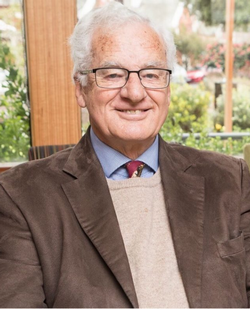
 Alan Nichols with Stephen Hale
Alan Nichols with Stephen Hale
During John Stott’s long and remarkable global ministry, he often weighed into the great theological controversies of his day. It would be unfair to suggest he was a controversialist, yet it would also be true to say he was unafraid of controversy.
This flowed out of his overall teaching, preaching, writing and speaking ministry. He was committed to engaging with the Word of God as well as the issues of his day. As he put it in his classic book, I Believe in Preaching (1982 and still in print), ‘the Bible in one hand and the newspaper in the other.’ Stott had a high commitment to seeking to unpack the scriptures but also to the application of the scriptures.
In my conversation with Alan Nichols he reflected on Stott’s approach and impact. In the course of Alan’s long ecclesiastical career he was involved in the communications team at the Lausanne Congress in 1974 as well as many other global and local EFAC gatherings. Alan had the privilege of seeing John Stott in action both up front and behind the scenes. This article is a series of reflections drawn from Stott’s books, his public engagements and the impact these made in particular on social justice, women’s ministry and simple lifestyle.
REFLECTION ONE: FAITHFULNESS TO SCRIPTURE
In 1974 the Lausanne International Congress on World Evangelisation responded to a revival of liberal theology across the world within Protestant and Independent churches. Faithfulness to Scripture became a fundamental doctrine of the Lausanne movement.
An example of John Stott’s involvement from these very early days was a keynote address at the Congress. His oratory skills and ability to capture an audience are demonstrated by this example of his witty reference to the conversation between Alice in Wonderland and Humpty Dumpty as a way of making his point.
‘“When I use a word” Humpty Dumpty said in a rather scornful tone, “it means just what I choose it to mean. Neither more nor less.” “The question is,” said Alice, “whether you can make words mean different things”. “The question is,” said Humpty Dumpty, “which is to be master—that’s all.”’
The issue between Alice and Humpty Dumpty—whether people can manipulate the meaning of words or whether words have an autonomy which cannot be infringed—is still a contemporary issue. The modern church sometimes seems like a theological wonderland in which numerous Humpty Dumpties enjoy playing with words and making them mean what they want them to mean. There is a tension here between faithfulness to Scriptural revelation and the temptation to be relevant. (See David Evans, ‘Evangelism with Theological Credibility,’ in One Gospel, Many Clothes: Anglicans and the Decade of Evangelism, eds. Chris Wright and Chris Sugden. EFAC, 1990. p. 32)
REFLECTION TWO: A SIMPLE LIFESTYLE
John Stott worked consistently with two global evangelical networks. As Chair of Lausanne’s Theology and Education Working Group together with Ronald Sider, from the World Evangelical Fellowship they convened over several years a network of hundreds of evangelical leaders from developing and first world countries which explored and unpacked the commitment to simple lifestyle as expressed in the Lausanne Covenant.
In 1980 Stott and Sider sponsored a four day conference in the United Kingdom on the theme of Simple Lifestyle. 85 Christian leaders from 27 countries met to ‘listen to the voice of God through the pages of the Bible, through the cries of the hungry poor, and through each other.’ Following the conference Stott commissioned Alan Nichols to write a ‘commentary and exposition’ on the key issues raised at the conference in a Lausanne Occasional Paper ‘An Evangelical Commitment to Simple Life-style’. Nichols’ paper offers insights raised at the conference into the global and local issues facing Christians and churches such as economic justice, care of creation, distribution of resources, poverty and wealth, personal lifestyle, justice and politics and international development.
John Stott himself sought to live a humble and simple lifestyle. He enjoyed life to the full but was also conscious of the impact of his lifestyle and actions. He said, ‘We become personally culpable when we acquiesce in the status quo by doing nothing.’ He was agreeing that political action without personal commitment lacks integrity.
REFLECTION THREE: EVANGELISM AND SOCIAL RESPONSIBILITY
The Lausanne Movement made its mark on churches and Christian communities around the world and in 1981 the second National Evangelical Anglican Congress Australia was held in Melbourne. Alan Nichols and John Williams edited the Congress papers, Agenda for a Biblical Church. John Stott laid the platform for the Congress with his opening Bible study on ‘The Gospel and The Kingdom’. He spoke of four dimensions of the final Kingdom which are emphasized in the New Testament—moral, social, physical and material. Jesus did this, and so should Christians. The poor are needy people suffering any kind of bondage and Jesus raises the poor from the dust (Psalm 113).
The Congress was a moving experience for many of the 550 participants, particularly in the areas of family relationships and social justice. There were groups from every State, including three Aboriginal Christian leaders from Arnhem Land as well as other Indigenous and women leaders. According to the report of the Congress
‘NEAC 1981 demonstrated a new maturity in the outlook of Australian evangelical Anglicans. We learned to live with diversity, not only in the Church at large, but among evangelicals with a common commitment to the authority of the scriptures. This new-found diversity needs liberty for action and generosity of outlook for tackling the debates of the 1980s and 1990s.’
During this period John Stott’s standing and leadership contributed significantly to this new maturity in the national Anglican church.
REFLECTION FOUR: GLOBAL IMPACT
In 1990 the book One Gospel, Many Clothes, was published worldwide by EFAC as retirement recognition of John Stott. Stott contributed with a chapter called ‘Evangelism through the local church.’ He outlined two false ages of the church of that time—introverted Christianity (the Religious Club) and the secular mission (religionless Christianity). This is but one example of Stott’s diverse and remarkable impact. As Alan comments,
‘The issues John Stott raised began to be replicated throughout the world. All over the world are flourishing Christian enterprises, groups, organisations and churches that were helped directly or indirectly by John Stott.’
This is illustrated by a range of case studies by global Christian leaders reflecting on the gospel and its connection to the realities in their communities. For example, Bishop David Gitari (later Archbishop) writing in ‘Kenya: Evangelism among Nomadic Communities’ says:
‘We have refused to put a wedge between evangelism and sociopolitical responsibility. We believe that this approach is required by obedience to the Great Commission and to the Great Commandment.’
Juliet Thomas takes up the theme of women’s ministry in her chapter ‘Women’s Role in Evangelism in India’. She references Stott’s views on this topic as set out in Issues Facing Christians Today (Basingstoke, Marshall 1984): Stott says that there is a general argument ‘in favour of women’s ministry (including leadership and teaching)’.
‘It is that on that Day of Pentecost, in fulfilment of prophecy, God poured out his Spirit on “all flesh”, including “sons and daughters” and his “servants, both men and women”. If the gift of the Spirit was bestowed on all believers of both sexes, so were his gifts. There is no evidence, or even hint, that the charismata in general were restricted to men […]. On the contrary, the Spirit’s gifts were distributed to all for the common good, making possible what is often called an “every-member ministry of the body of Christ.”’
Affirmation of Stott’s views are expressed in The Lausanne Covenant which says,
‘We express penitence both for our neglect and for having sometimes regarded evangelism and social concern as mutually exclusive. Although reconciliation with man is not reconciliation with God, nor is social action evangelism, nor is political liberation salvation, nevertheless we affirm that evangelism and socio-political involvement are both part of our Christian duty. For both are necessary expressions of our doctrines of our God and man, our love for our neighbour and our obedience to Jesus Christ.’ (Footnote 5, p. 69)
In summing up John Stott’s contribution Alan Nichols puts it this way:
‘Over the many years of my experience as a parish priest, welfare executive, public policy work in Australia and international development and as a committed evangelical in theological ministry I have found inspiration and affirmation through John Stott’s leadership and ministry over decades to ask as he did: “what is the biblical gospel for the modern world, the living gospel for the changing world.”’
In his time, John Stott courageously addressed issues of traditional views that defined evangelicalism and courageously transformed them.
